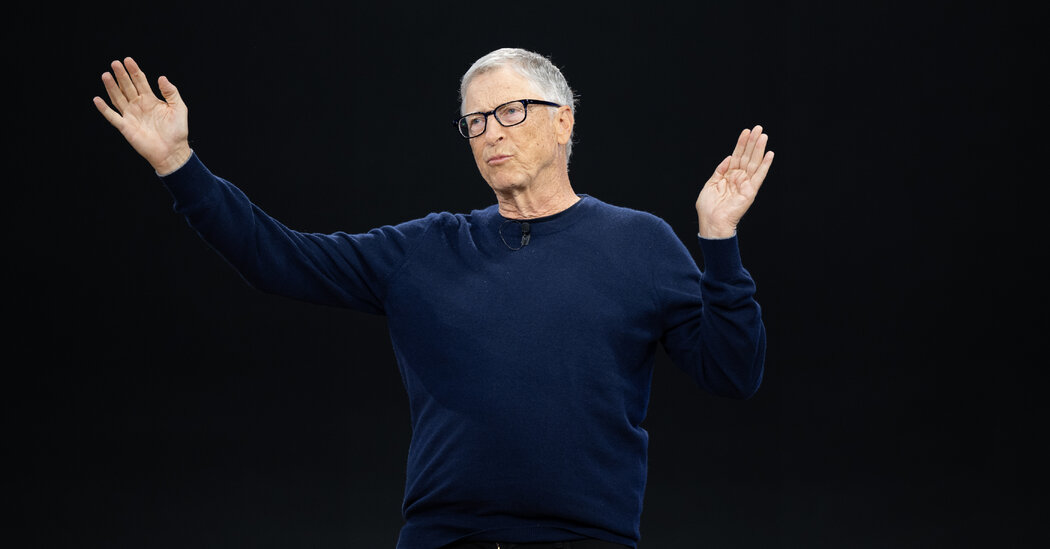Andrew here. The talker of the morning: Bill Gates, the billionaire philanthropist and climate activist, is warning that the “doomsday outlook” is overdone and “will not lead to humanity’s demise.” He is shifting his metric for prioritizing “improving lives” rather than simply limiting the rise in temperature.
I spoke to Gates, and one thing he is clear about is that this isn’t a reversal — or at least he doesn’t see it that way. He believes you can hold two ideas in your head at the same time: Temperature is rising, but it shouldn’t be the only focus. His critics may seize on his words as evidence that the effort around climate has been misguided. That’s not what he is saying, but it will probably cause quite a debate.
“Tough truths”
After spending billions in the fight against climate change, Bill Gates has just announced a drastic “strategic pivot” on the issue.
His latest vision may anger some climate activists. But it could also fire up entrepreneurs who have long been calling for more capital to be invested in breakthrough ideas that tackle the challenge.
The latest: In a memo, titled “Three tough truths about climate,” published hours ago, the tech mogul and philanthropist did not mince words. The “doomsday view” that climate change will “lead to humanity’s demise” is a mistake, he wrote.
Worse, he added:
“Unfortunately, the doomsday outlook is causing much of the climate community to focus too much on near-term emissions goals, and it’s diverting resources from the most effective things we should be doing to improve life in a warming world.”
It’s worth noting that his 2021 best-selling book, “How to Avoid a Climate Disaster,” laid out a blueprint for lowering emissions. Now, he writes: “Emissions projections have gone down, and with the right policies and investments, innovation will allow us to drive emissions down much further.”
There’s disagreement on that point. The decade-old Paris climate pact sought to keep emissions in check as part of a wider effort to keep the global rise in temperatures under 1.5 degrees Celsius. Last week, António Guterres, the U.N. secretary general, said that “overshooting is now inevitable.”
What’s next? While Gates argues that every warming degree matters for the planet, he has called on policymakers at the COP30 climate summit in Brazil next month to broaden their focus beyond emissions, to zero in on preventing disease and fighting poverty.
He also has tough words on that front. Since the Trump administration cut foreign aid budgets and gutted the U.S. Agency for International Development, the Gates Foundation has plowed more money into addressing health and poverty in poorer countries. Those causes are interlinked with climate, he argues: “We can’t cut funding for health and development — programs that help people stay resilient in the face of climate change.”
(In May, Gates, who turned 70 on Tuesday, laid out a 20-year spending plan that would result in the foundation closing shop.)
Gates expects this shift will be contentious. He told reporters before the memo’s release: “If you think climate is not important, you won’t agree with the memo. If you think climate is the only cause and apocalyptic, you won’t agree with the memo.”
HERE’S WHAT’S HAPPENING
Amazon announces big job reductions. The online retailer said on Tuesday that it would lay off about 14,000 corporate employees. According to The Wall Street Journal, that number could rise to as many as 30,000. reports. The layoffs come as the company tries to lower expenses and reverse overhiring during the early years of the coronavirus pandemic. And PwC has abandoned plans to add 100,000 employees, The Financial Times reports, as recruitment experts warn of a “Great Freeze” in the job market.
David Solomon says he sees “no systemic crisis” in private credit. Speaking on the sidelines of the Future Investment Initiative in Riyadh, Saudi Arabia, the Goldman Sachs C.E.O. played down worries about risks in the private credit market after the collapse of First Brands Group and Tricolor Holdings. Still, some market watchers worry that the rise of so-called shadow banks may be hiding financial dangers. The failures of First Brands and Tricolor led Jamie Dimon of JPMorgan Chase to warn that “when you see one cockroach, there are probably more.”
AMD and the Energy Department agree on a $1 billion supercomputer partnership. The tie-up involves the construction of two supercomputers that can run complex experiments that require enormous amounts of data-crunching capability. Energy Secretary Chris Wright said the plan was meant to “supercharge” advances in fusion energy, drug development and technologies for defense. The first computer is expected to come online within six months and will use some of the same artificial intelligence chips that OpenAI is using for some applications.
Trade deals roundup
The global stock rally is taking a breather on Tuesday as investors wait to see whether President Trump’s Asia deals tour truly pays off.
Here’s the latest:
Trump’s visit to Japan generated lots of headlines, but details were sparse. Trump and Sanae Takaichi, the new prime minister of Japan, signed two documents: one promising to cooperate on expanding their supply chains for rare earth metals and another that pertained to the initial framework deal the Trump administration announced in July.
“We are an ally at the strongest level,” Trump said.
But the documents were vaguely worded. In the release on trade, the White House said that the two countries had “confirmed their strong commitment to implementing this GREAT DEAL.” But crucially, it did not offer any specifics about Japan’s agreement in July to buy American rice, soybeans and automobiles, or its vow to invest $550 billion in the U.S.
-
Similarly, the agreement to increase the supply of critical minerals and rare earths was short on specifics.
-
It’s worth noting that Trump on Sunday had announced deals with Malaysia, Thailand and Cambodia to bolster U.S. access to critical minerals and rare earths, as Washington seeks to reduce its (and the world’s) dependence on China for them.
-
Takaichi did pledge, however, to raise Japan’s military spending to 2 percent of G.D.P. by March, two years earlier than planned. The Trump administration has pushed several governments, including in countries where the U.S. has bases — like Japan — to pay more for their own military protection.
The focus continues to be on China. Trump’s meeting on Thursday in South Korea with President Xi Jinping of China is still a go. Treasury Secretary Scott Bessent confirmed on Air Force One that Trump and Xi would discuss the U.S.-China trade deal framework reached over the weekend, as well as fentanyl, rare earth minerals and Chinese purchases of U.S. agricultural products.
Xi has his own agenda. The Chinese leader is expected to try to persuade Trump to soften U.S. diplomatic support for Taiwan.
In other trade news, the Mexican peso jumped on Monday on news that Mexico and the U.S. had agreed to extend by several weeks a Nov. 1 deadline to reach a trade deal to put off punishing tariffs.
Exclusive: A livestream shopping start-up raises funding
Livestream shopping, effectively the e-commerce equivalent of QVC for the TikTok era, has been growing in popularity in the West in recent years.
Now one of the biggest names in the sector, Whatnot, is poised to announce that it has amassed a major new war chest from investors at a big valuation, Michael de la Merced is the first to report.
Whatnot has raised $225 million at an $11.5 billion valuation, the Los Angeles-based company plans to disclose on Tuesday. The new round comes less than a year after its last one, when it was valued at just under $5 billion.
Leading the round are DST Global and CapitalG, the growth-capital investment affiliate of Google. Other participants include Sequoia Capital, a new investor, as well as Greycroft, Andreessen Horowitz, Avra and BOND.
Beyond the fund-raising, Whatnot will announce that it will let existing shareholders sell up to $126 million worth of stock.
The round is a bet on the popularity of livestream shopping. The format, which first became popular in 2016 in China, features sellers who broadcast the goods they are selling, sometimes putting on highly produced shows.
It’s also a wager on Whatnot’s rapid growth. The start-up, which began life in 2019 as a way to sell Funko collectible figurines, has rapidly expanded:
-
It recently surpassed $6 billion worth of goods sold on its platform, doubling what it had achieved at the end of 2024.
-
Viewers now spend on average more than 80 minutes watching livestreams on the platform.
-
The company now offers a wide range of categories, including fashion, electronics and even plants.
“We have gained conviction with each round,” Laela Sturdy, a managing partner at CapitalG who sits on Whatnot’s board and has tracked the company since 2021, told DealBook.
But Whatnot faces several challenges, including competition from other livestream shopping specialists, as well as more established platforms like Amazon, Poshmark and perhaps the biggest name in livestream shopping: TikTok Shop.
There is also the question of how much bigger live shopping will become. The sector is expected to hit $49 billion in sales this year, growing to $60.6 billion by 2028, according to data from eMarketer. But the industry’s growth rate is expected to slow drastically over that time, eMarketer adds, and sales in China far outpace those in the rest of the world.
Still, the company sees room for growth. Grant LaFontaine, a Whatnot founder and its C.E.O., told DealBook that he planned to expand the company to more markets by the end of 2026 — potentially to Asia, including Japan.
Where investors and the public differ on A.I.
The hope that artificial intelligence will significantly lift workplace productivity has helped bolster corporate adoption and has ushered in a wave of investment.
It is, perhaps, no surprise then that a survey by JUST Capital published on Tuesday shows that 96 percent of the investors it polled are bullish on A.I.’s potential for workplace productivity gains.
But the wider public isn’t so sure. Only 47 percent of non-investors surveyed said that A.I. would have a positive impact in this area. (Two groups were polled: investors and non-investors.)
The poll did find agreement between both groups on the need to spend more on A.I. safety.
The upshot: A majority — including 57 percent of investors and 53 percent of all others polled — said that companies should spend more than 5 percent of their total A.I. investment on so-called guardrails to ensure that the technology did not have adverse effects on certain groups, or society as a whole.
THE SPEED READ
Deals
-
Shares in Keurig Dr Pepper soared on news that it is raising $7 billion from Apollo and KKR to help finance its acquisition of JDE Peet’s. (FT)
-
Russia’s second-largest oil producer, Lukoil, said it planned to sell international assets just days after the Trump administration hit it with sanctions. (Bloomberg).
Politics, policy and regulation
-
The Consumer Financial Protection Bureau will reportedly block states from having medical debt excluded from some individual credit reports. (The Lever)
-
The largest union of federal workers called on Congress to pass a spending bill to immediately end the government shutdown, essentially shifting support to Republicans who have opposed Democratic efforts. (NYT)
Best of the rest
-
“Inside the Trump family’s global crypto cash machine” (Reuters)
-
JPMorgan Chase has reportedly allowed employees to use its in-house A.I. chatbot to generate year-end performance reviews. (FT)
We’d like your feedback! Please email thoughts and suggestions to [email protected].
Andrew Ross Sorkin is a columnist and the founder of DealBook, the flagship business and policy newsletter at The Times and an annual conference.
Bernhard Warner is a senior editor for DealBook, a newsletter from The Times, covering business trends, the economy and the markets.
Sarah Kessler is the weekend edition editor of the DealBook newsletter and writes features on business.
Michael J. de la Merced has covered global business and finance news for The Times since 2006.
Niko Gallogly is a Times reporter, covering business for the DealBook newsletter.
The post Will Bill Gates’s ‘Strategic Pivot’ Shake Up Climate Policy? appeared first on New York Times.




